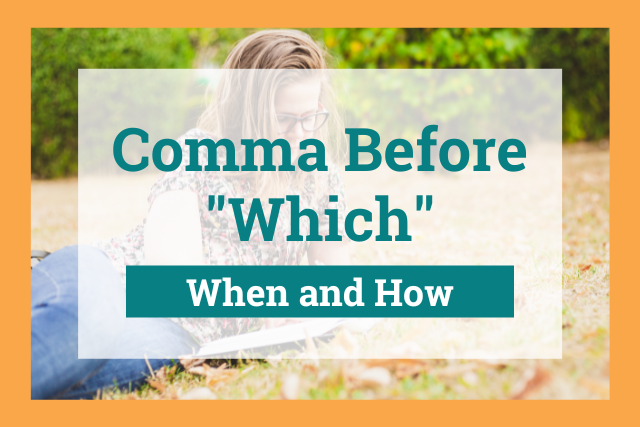
Comma rules are confusing because they change depending on the situation. You might be unsure whether to use a comma before which since the answer is different depending on the sentence.
In general, the rule is to only use a comma before which when which is part of a non-restrictive clause.
You can always double-check your comma usage with our free grammar checker. But let’s take a closer look at the rules about commas before which, so you can avoid making a mistake in the first place.
Do You Put a Comma Before Which?
There are three main situations when you might use which in a sentence:
- In dependent clauses
- In questions
- In prepositional phrases
We’ll discuss each of these usages and whether to use a comma before which in them.
Comma Before Which in Non-Restrictive Clauses
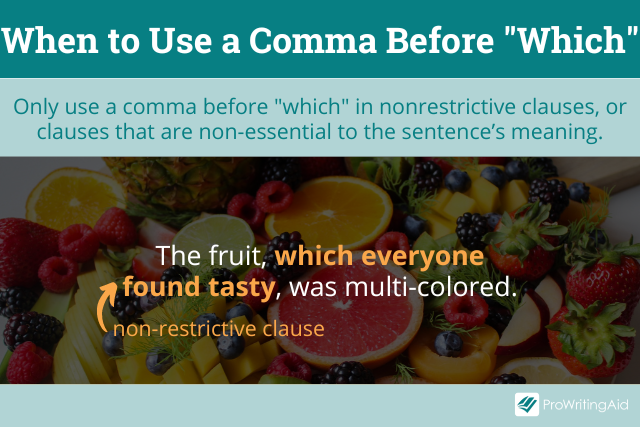
A dependent clause can be classified as either a restrictive clause or a non-restrictive clause. To know when to use a comma before which, you need to understand the difference between these two types of clauses.
A restrictive clause is also called a defining clause. These clauses add crucial information to a sentence. If you remove a restrictive or defining clause, you change the sentence’s meaning.
For restrictive clauses, do not use a comma before which or after the clause. Here’s an example:
Correct: The house which we toured on Saturday sold above the asking price.
Incorrect: The house, which we toured on Saturday, sold above the asking price.
Incorrect: The house, which we toured on Saturday sold above the asking price
Incorrect: The house which we toured on Saturday, sold above the asking price.
The “which clause” is essential to the sentence. Without it, we don’t know which house we’re talking about. That makes it restrictive.
However, we use a comma before which in non-restrictive clauses. A non-restrictive clause adds non-essential information to a sentence. The meaning of the sentence stays the same if we remove a non-restrictive, or non-essential, clause.
You should also place a comma after non-restrictive clauses. Think of the commas as bookends marking the part of the sentence that contains non-essential information. Let’s check out some examples.
Correct: Making the fruit salad, which everyone found tasty, was my best idea.
Incorrect: Making the fruit salad which everyone found tasty was my best idea.
Incorrect: Making the fruit salad, which everyone found tasty was my best idea.
Incorrect: Making the fruit salad which everyone found tasty, was my best idea.
If the “which clause” is non-restrictive and falls at the end of a sentence, place a comma before which, then end the sentence with the appropriate ending punctuation. It should look like this:
Correct: I brought fruit, which was my best idea.
Remember: restrictive clauses don’t require commas but non-restrictive clauses do. An easy way to remember this is by noting that a restrictive clause restricts commas.
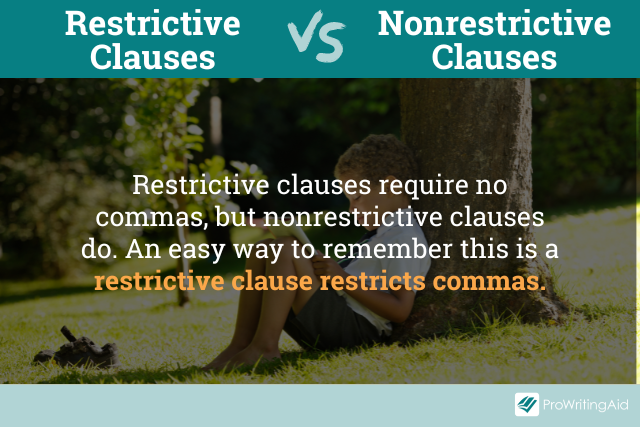
Comma Before Which in Questions
Sometimes people erroneously put a comma before which in questions. There is no need to use a comma before which in any question.
Direct questions might start with which (e.g. Which one do you want?). Obviously, these don’t need a comma before the sentence begins.
But which might also appear in indirect questions. An indirect question is a question inside a statement. Let’s check out an example of an indirect question that uses which.
Correct: I asked Sam which bus I should take.
Incorrect: I asked Sam, which bus I should take.
You can see that there is a hidden question in that sentence (which bus should I take?). But it’s framed as a statement. Do not put a comma before which in an indirect question.
The exception to this rule is if there is a direct question in quotation marks. In this case, you should follow the rule about commas and open quotation marks: use a comma before the open quotation mark.
Correct: I asked Sam, “Which bus should I take?”
Incorrect: I asked Sam “Which bus should I take?”
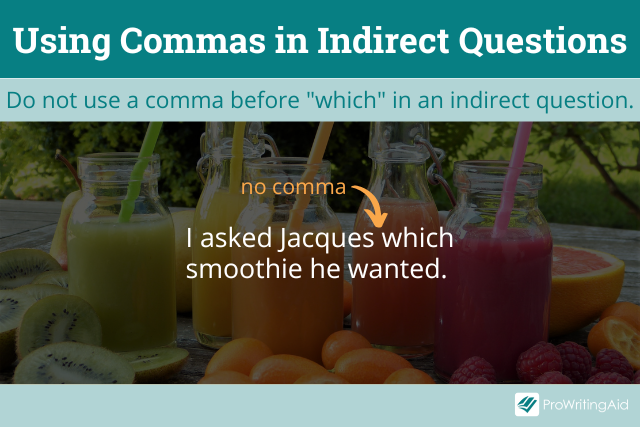
Comma Before Which in Prepositional Phrases
The word which is sometimes part of a prepositional phrase. A prepositional phrase is a part of a sentence that starts with a preposition. “Which” is often paired with the prepositions of, in, on, and to.
Do not place a comma before which when it is part of a prepositional phrase. Check to see what word precedes which to know whether it’s part of a prepositional phrase.
Correct: The bridge on which we stood was over 300 years old.
Incorrect: The bridge on, which we stood was over 300 years old.
Can You Put a Semicolon Instead of a Comma Before Which?
Semicolons separate independent clauses without a conjunction. They cannot be used like commas. Never use a semicolon before which.
Correct: Everyone who read the book, which was recommended by Julie, enjoyed it.
Incorrect: Everyone who read the book; which was recommended by Julie enjoyed it.
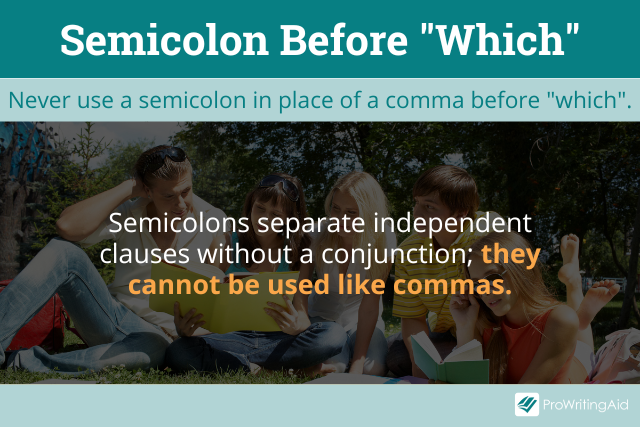
Do You Put a Comma After Which?
While you might need to place a comma after a non-restrictive phrase, never place a comma directly after the word which.
Correct: I drank the tea, which I had gotten for Christmas, and curled up with a good book.
Incorrect: I drank the tea which, I had gotten for Christmas, and curled up with a good book.
The comma should only go before the word which in a non-restrictive clause, not after.
Examples of Comma Before Which in Sentences
Let’s check out a few more examples of sentences that include a non-restrictive phrase starting with the word which.
- The Texas Rangers, which is my favorite baseball team, lost against the Houston Astros last night.
- I have two bananas left, which is enough for banana bread.
- Brad Pitt had his big screen debut in Thelma and Louise, which is a great movie.
- Basset hounds, which were first bred in France, always have a white tip on their tails.
There’s only one main circumstance when you need a comma before which.
If you can remember that you only use a comma before which with non-restrictive clauses, you’ll make fewer comma placement mistakes in your writing.


